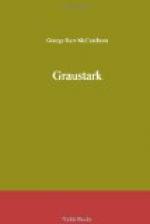Traveling, of course, was pleasant at this time of the year, and the two Americans saw much that interested them along the way. Their French, especially Anguish’s, was of great value to them, for they found occasion to use it at all times and in all places. Both spoke German fairly well, and took every opportunity to brush up in that language, Lorry remembering that the Guggenslockers used many expressions that showed a preference for the Teutonic. The blithe Anguish, confident and in high feather, was heart and soul in the odd expedition of love, and talked incessantly of their reception by the far-away hostess, their impressions and the final result. His camera and sketching materials were packed away with his traps. It was his avowed intention to immortalize the trip by means of plate, palate and brush.
At the end of two days they reached a certain large city,—the first change, and then seven hundred miles to another. The distance from this point to the capital of Graustark was two hundred miles or more, chiefly through mountainous lands. Somewhat elated by the cheerful information there received, they resumed the journey to Edelweiss, the city of vale, slope and park,—summer, fall and winter. Changing cars at the end of the second day out, they sat back in the dusty seats of their carriage and sighed with relief.
“Unless we jump the track, this train will land us in the city we are looking for,” said Anguish, stretching out his legs comfortably. “I’ll admit it has been a tiresome journey, and I’ll be glad when we can step into a decent hotel, have a rub, and feel like white men once more. I am beginning to feel like these dirty Slavs and Huns we saw ’way back there.”
“There’s one thing certain,” said Lorry, looking out of the window. “The people and the habitations are different and the whole world seems changed since we left that station. Look at those fellows on horseback over there.”
“What did I tell you about brigands and robbers!” exclaimed Anguish. “If those fellows are not bandits I’ll lose faith in every novel I ever read.”
The train rolled slowly past three mounted men whose steeds stood like statues upon a little knoll to the right of the track, men and beasts engaged in silent contemplation of the cars. The men, picturesquely attired and looking fierce, carrying long rifles, certainly bore an aspect that suggested the brigand. When the guard entered the carriage Anguish asked in German for some information concerning the riders.
“Dey’re frontier police-guards,” responded the man in English, smiling at their astonishment. Both Americans arose and shook hands with him.
“By George, it’s good to hear a man talk white man’s language,” cried Anguish.
“How do you come to be holding a job on this road? An Englishman?” demanded Lorry. He looked anything but English.
“I’m not an Englishman,” said the guard, flushing slightly. “My name’s Sitzky, and I’m an American, sir.”




